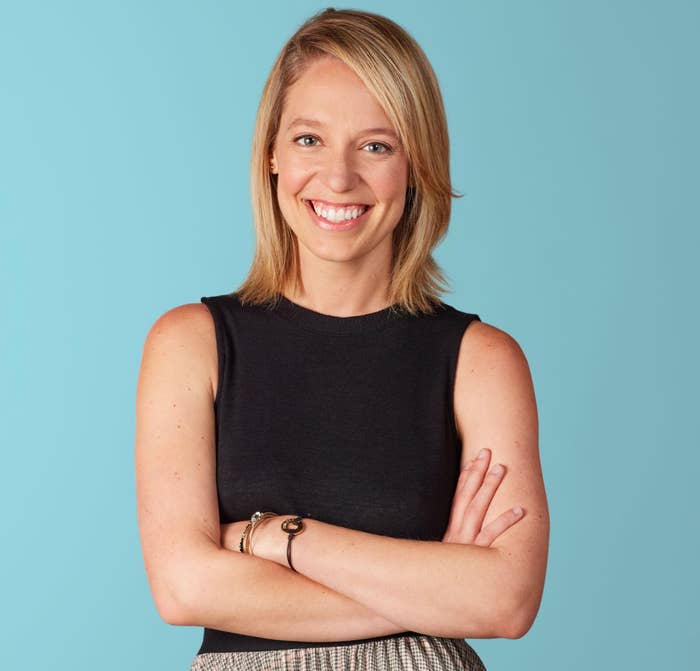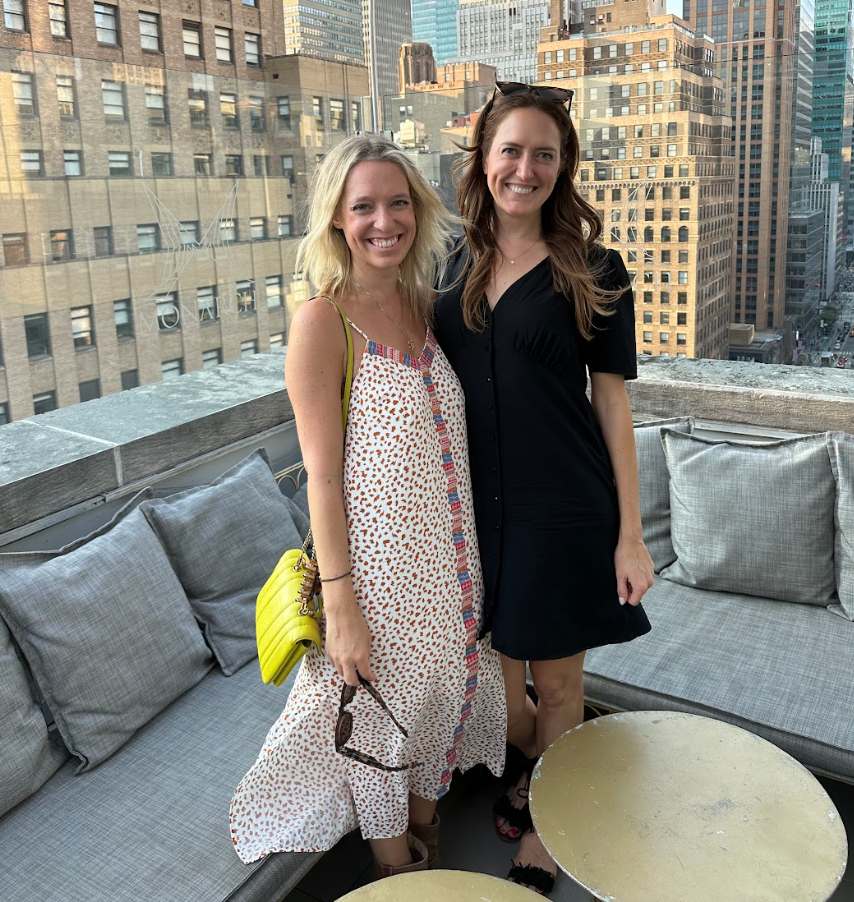
I stared out floor-to-ceiling windows at the frigid Hudson River. It was just days before the winter-holiday slowdown at work, and in that stark industrial room, all of my colleagues stared, too, just like we had the prior December (and the one before that).
An executive spoke coldly about budget cuts and the need to maximize value by remaining “lean and mean.” Then we were ordered back to our desks, which were lined up in long rows a floor away.
First, there was silence. Then the firings began.
One by one, I’d hear a phone ring and pray it wasn’t mine. If it was, it meant I’d soon be leaving my desk for the last time. After a fateful walk to Human Resources to sign paperwork, I’d then be escorted out of the building while an ex-coworker would pack up my things.
Years later, tears still fill my eyes remembering taping up boxes for my friends. One second they were there, and the next they were gone without even a goodbye. I was always the lone survivor, and some days, the guilt was enough to make me want to follow them out the door.
Year after year, the layoffs continued, but I remained. Once a part of a small editorial team of three at one of the world’s most famous lifestyle brands, by the end, I was a sad and scrappy team of one. My second to last joyful season of firings, my boss was cut. Then one year later, they fired the editor beneath me and decided I could handle things on my own.
You are a rockstar! You are so efficient! Take this raise! Hooray, you!
When I couldn’t keep up with the workload, I was told to work harder. Faster.
“But it’s too much,” I pleaded.
“Stop with the negativity,” they said.
After one too many days spent crying in the bathroom with no friends left in sight, I finally broke. I quit my job without anything lined up, a bold move that would become an even bolder 10-year pattern that I never could have anticipated as an eager kid barely out of college.
For the next decade I repeated this cycle: Get a shiny new job. Get promoted. Get burnt out. Quit. Writing it now, it seems rather obvious I had a problem. But living through it, I felt like I was anything but the problem. They were the evil employer. I was the prized employee who never got fired. Not only that, after each valiant, dramatic resignation I put in, my friends would applaud me.
You’re so brave! So inspiring! So true to yourself!
However, toward the end of each one of my fateful job finales, another pattern had emerged — one people didn’t see. I’d stop eating. Lose weight. Have panic attacks. My anxiety would ultimately become unbearable, and that’s when I’d get up the gusto to quit. So brave and inspiring, right?
I gave every job everything I had. My mornings, my breaks, my nights, my weekends, and of course, every hour in between. As a result, I was spared through countless slaughterings. I mean come on: What boss would ever dream of firing a person like that? A human so dedicated, she’d jump through flaming hoops to get her job done. Then something unexpected happened: I burnt out on life — not just work — and realized I was actually just a human with absolutely no boundaries.
Zero. Zilch. None.

Through the blur that were the years spent “building my career,” I met a man and he asked me to marry him. He was wonderful and caring, and he still is. We were happy together, so when he got down on one knee, I said yes despite having been adamantly against the idea of marriage my whole life. My mother, after I told her the news, didn’t say congratulations but: “Wow, I really didn’t know if you’d say yes.”
Well, yes mom. I did. Why? I didn’t know how to say no.
Hell, “no” wasn’t even in my repertoire. I did whatever I needed to keep the peace. Keep a good GPA. Keep money in my bank account. But now my inability to set a boundary when it came to honoring my own happiness was officially catching up. After six years of marriage, the truth of never wanting an “I do” in the first place had crept up in a myriad of ways, and soon it was yelling at me so loudly that I couldn’t drown it out anymore. So, I quit my marriage, too.
After my divorce, I started therapy. That’s where I’d learned just how much my lack of boundaries had been sending me running in circles my whole life. Ignoring my own needs had become second nature. It ensured things didn’t change. It ensured people stuck around. And as it’d turn out, it also ensured I stayed employed. And, at the heart of everything, it ensured some part of me felt safe.
But what felt like winning — whether it was friends, promotions or love — had actually been losing what mattered most. I’d lost time to pursue my dream of writing a book, friendships that kept me afloat, and ultimately, myself because I never learned to set a boundary to keep people from taking too much of me. So I set out to do just that.
With the help of my therapist, I started saying no to plans I didn’t want to do. I started saying no to holidays if it meant being around family members who belittled me. I even started to say no to friends who didn’t know how to set boundaries of their own. That’s when something all-too familiar happened: My team shrank at work, and I was asked to pick up the slack. It felt like the ultimate test, and I accepted:
No, I cannot work extra hours because we are short-staffed.
No, I cannot do two jobs because someone left.
No, I cannot hit two project deadlines instead of one by Monday.
I uttered that last one on a Friday, but I made a fatal mistake afterward. When my boss pushed me harder to hit both deadlines, instead of sticking to my guns, I said the two words that have gotten my people-pleasing self into more sleepless nights than any others: “I’ll try.”
I woke up with a tightness in my chest on Sunday morning. The work was still not done despite trying my damndest the day before. Could I try to finish it if I worked another seven-hour day? Yes. Would I have to cancel plans with friends? Yes. Would I have to forgo working on my manuscript? Yes. Then, in spite of my ego wanting so badly to please, I decided the answer was no.
Come Monday, instead of feeling like a hero walking into work like I often did at the beginning, I felt nauseous. I immediately admitted to my team that no, I was not able to hit the deadline, but I tried. An hour later, my boss called me into her office.
“It’s less than a month into the new year, and I already hear you saying ‘no,’ again,” she said, exasperated. “It’s unacceptable.”
Little did she know, I’d spent the past three years in therapy practicing how to say exactly that: N-O. Two little letters that when put together had the magical ability to set a boundary that would protect me from burning out and betraying my integrity. But little did I know that when you finally learn that no is indeed an acceptable answer, you will also quickly discover who disagrees. By the end of the week, I was fired.
That Friday, I was escorted out of the building. My friends were left to pack my things from my desk in small boxes like I had done so many times for others. I felt like a complete failure, not yet seeing the longer story buried beneath the surface of how I got here. But I do now. What felt like a mortifying public defeat was actually my biggest internal victory yet.
The people-pleaser in me died that week, and I admit that I completely crumbled after getting kicked to the curb. In many ways, my worst fears were realized: Staying true to yourself by setting boundaries can result in an enormous amount of pain. But from the rubble, I emerged as someone else.
Looking back, with no full-time job in sight, I’ve made the hard decision not to look for one. As a recovering over-achieving people-pleaser who has struggled so hard to learn to set boundaries, the risk of signing up to work for someone else who doesn’t respect them is simply too great for me.
Right now, I’ve decided to work jobs that don’t demand more than I can give. As a result, I have restored friendships and even finished the book I dreamed of writing. Yes, it’s scary going my own way. Yes, some people doubt I can make it work. Yes, I feel lonely and uncomfortable most days. But, no: I will not let that stop me.

Liz Regalia is a writer and editor based in Charleston, South Carolina. She has over a decade of experience covering lifestyle, health and wellness for a variety of national publications, and has also overseen digital content programming and editorial strategy at various media companies. She just completed her first novel which she hopes will find a publishing home very soon.
This article originally appeared on HuffPost in May 2025.
